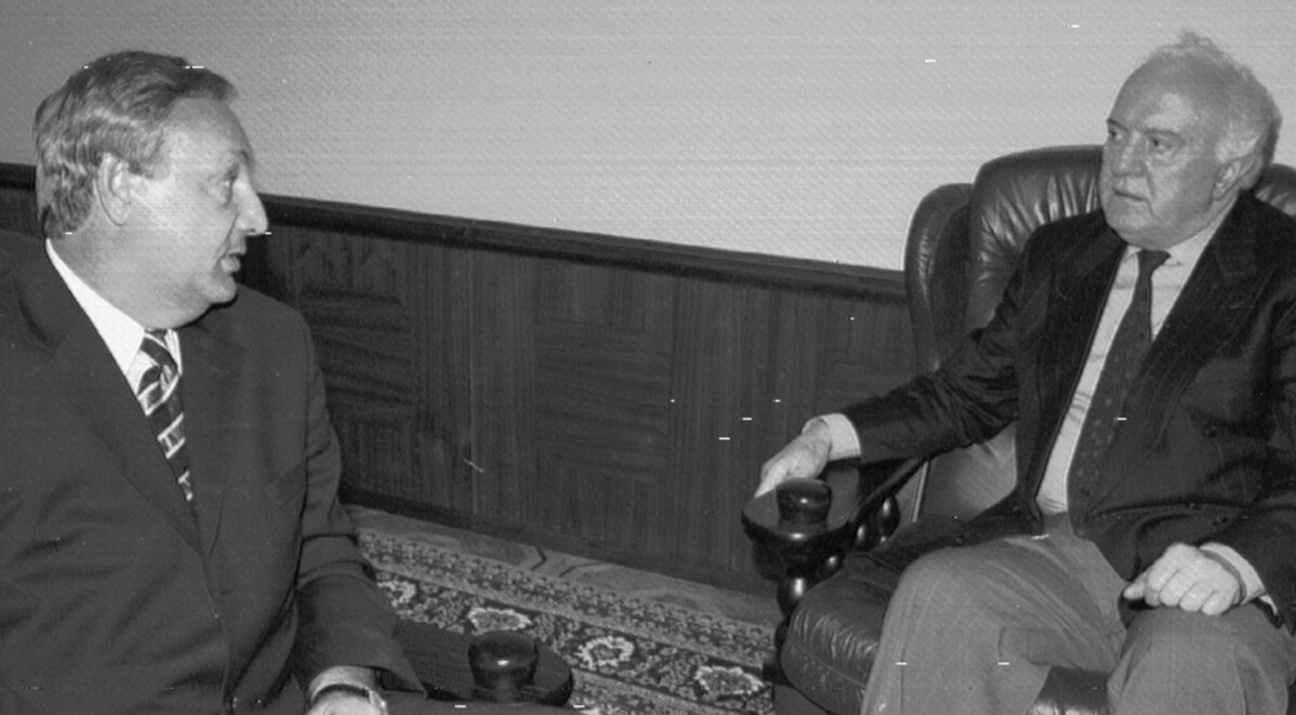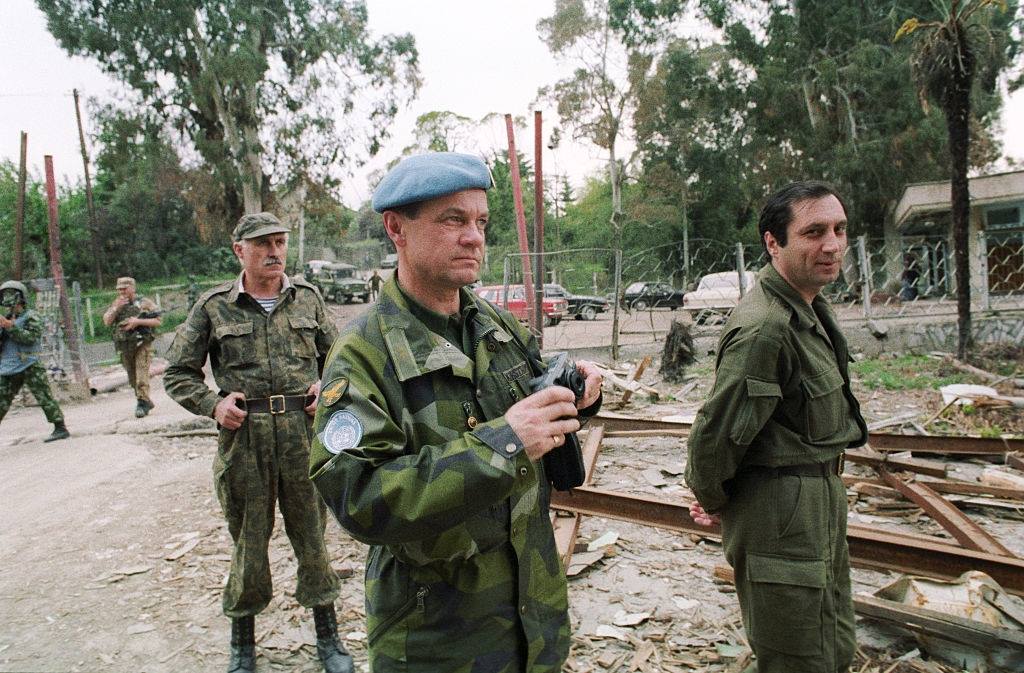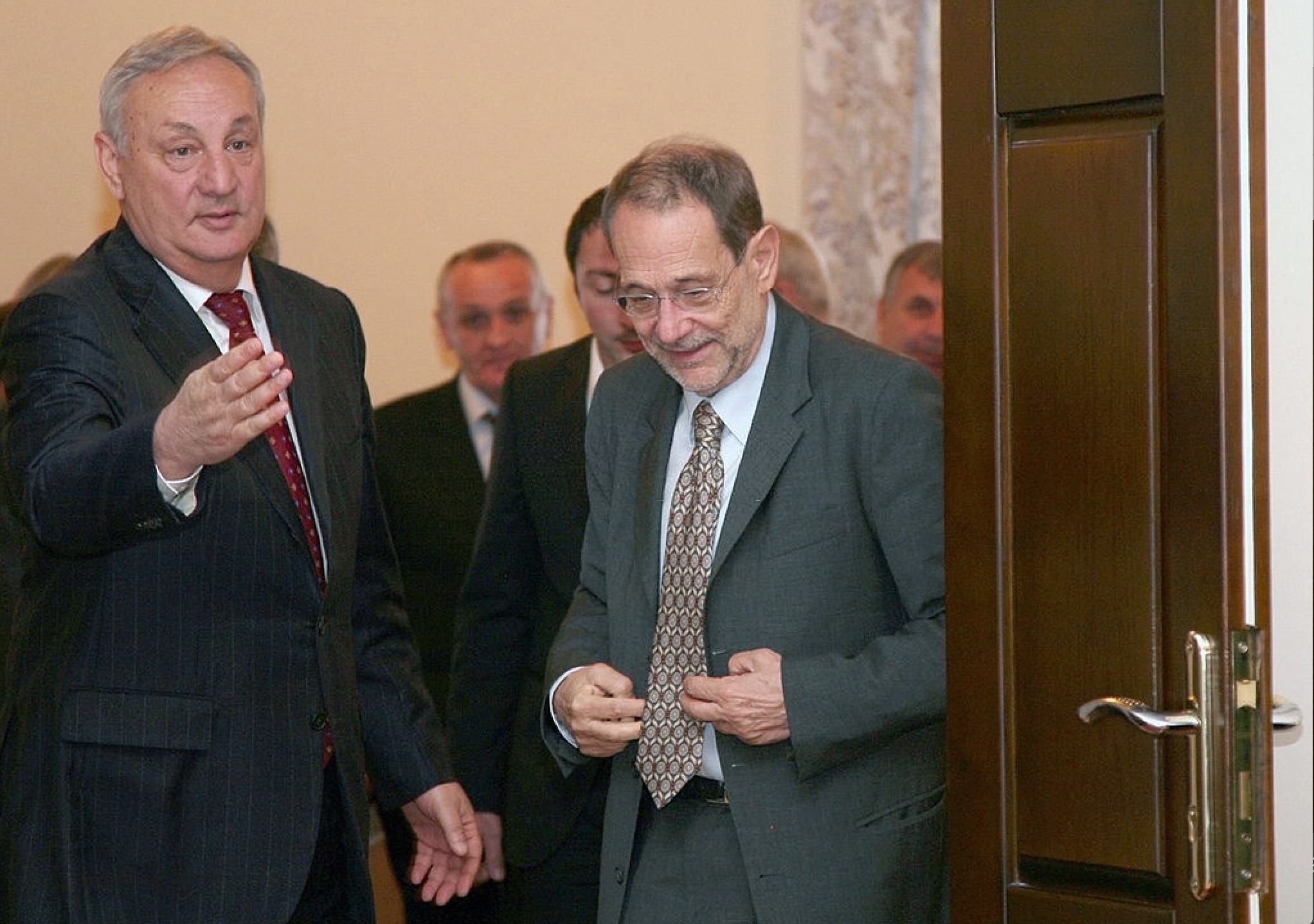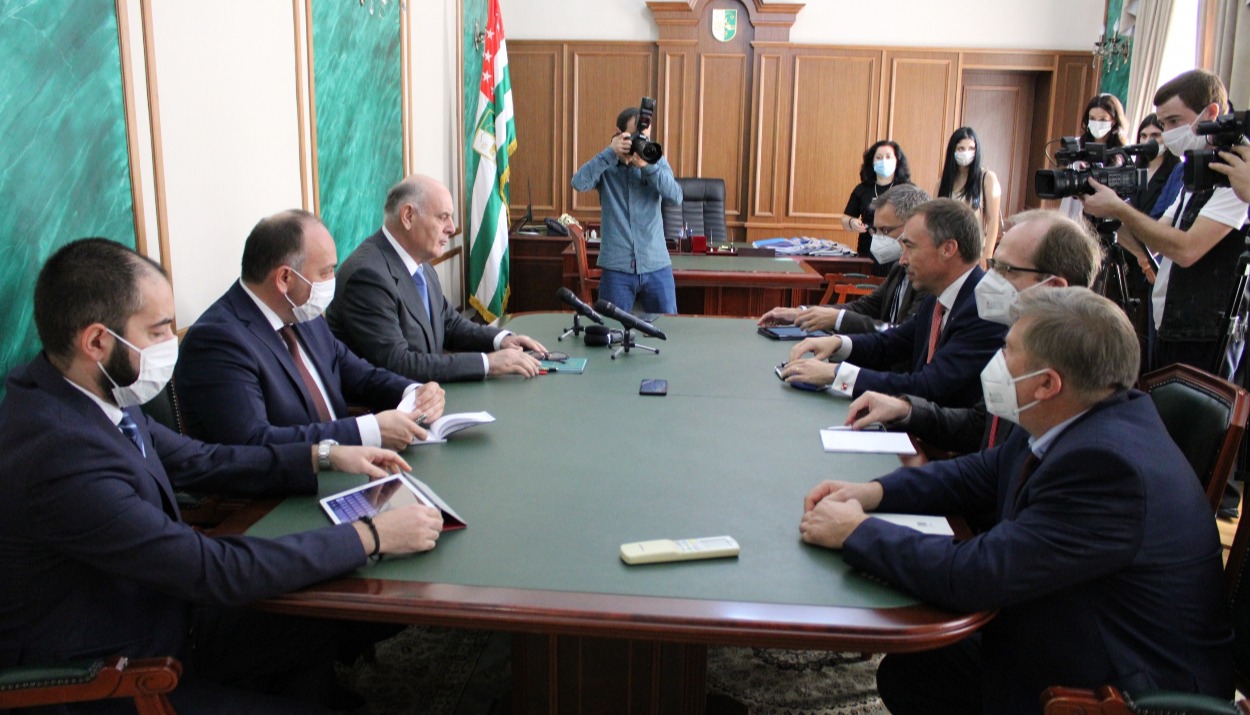How can Georgian-Abkhaz conflict be settled in the realities of today's world? By Astamur Tania

Sergey Bagapsh (left) and Eduard Shevardnadze. Tbilisi, 1997
Abkhaz political scientist Astamur Tania shares his thoughts on Abkhaz-Georgian relations, protracted negotiations, and possible areas of future cooperation.
Article was original published at Abkhazia-inform and translated by JAM-News.
Last year’s escalation of the Armenian-Azerbaijani conflict, which led to a significant change in the geopolitical situation in the eastern part of the South Caucasus, has once again actualized the issue of unrecognized and partially recognized territories in the post-Soviet space.
For more than a quarter of a century, the countries which, in the eyes of the international community, are viewed as illegitimate descendants of the collapsed USSR, have existed under the status quo formed as a result of hostilities, and it seemed that they would continue to do so for many decades to come.
This was the opinion not only of international actors participating in the long-term process of conflict resolution but also of these countries themselves, accustomed to living with suspended international legal status and all the ensuing consequences.
The absence of hostilities created an illusion of a lasting peace, which suited both the unrecognized states and major world players, whose attention was diverted to solving more pressing international matters.
Naturally, all unresolved conflicts in the post-Soviet space have many features that distinguish them from each other, but from the outside, especially from the point of view of most influential states, they seem almost identical.
This disappearance of the distinguishable features of each of the unrecognized states is largely due to the departure of the conflicts to the periphery of international attention, which was, on the one hand, associated with relative stability, and on the other, with the loss of hope for a speedy resolution of conflicts through negotiations.
Therefore, especially in the light of the recent Caucasian events, it seems appropriate to analyze the current situation and try to think of possible models of the development of events in the zones of “forgotten” conflicts, in particular, the Georgian-Abkhaz one.
Negotiations and their results
The Georgian-Abkhaz conflict, was the only conflict in the post-Soviet space, the resolution of which was dealt with at the highest international level – under the auspices of the United Nations, with the assistance of Russia and with the participation of the United States, Great Britain, Germany, and France as observers.
The situation in the conflict zone was described in detail four times a year in the reports of the UN Secretary-General to the UN Security Council, which resulted in the adoption of two resolutions and two statements by the UN Security Council President every year.
Abkhazia and Georgia which were assigned the status of parties to the conflict during the negotiations, signed many documents, including those that played a significant role in maintaining the ceasefire, returning refugees and solving numerous humanitarian problems.
The UN Human Rights Office was working in Sukhum along with dozens of international and non-governmental organizations which made a great contribution to solving such problems as demining, provision of food, medicine, and essential goods to the population affected by the conflict, rehabilitation of schools, hospitals, transport infrastructure facilities, implementation of projects to support the development of civil society and more.
This assistance was of particular importance in the context of tough CIS sanctions, which limited trade, economic and transport ties between Abkhazia and Russia, as well as hindered the movement of citizens.
Naturally, the relations of unrecognized Abkhazia with international organizations and states that participated in the settlement of the conflict were anything but easy. The main problem and the root of many more issues to come was the international organization’s desire to implement all projects with the sanction of Georgia in order to demonstrate the extension of its jurisdiction to the territory of Abkhazia.
In addition, during the first few years after the conflict had ended, humanitarian efforts of the international community prioritized providing assistance to Georgian refugees who returned to the Gal region.
This created the impression of an unequal attitude towards other residents of Abkhazia, including those who were forced to abandon their homes due to the outbreak of the military conflict.

UN representatives on a visit to Eshera during the 1992-93 war. Sergey Shamba on the right.
However, in the course of negotiations and discussions with the participants in the peace process, these problems were resolved, and the whole of Abkhazia began to receive significant volumes of assistance from the international community.
Representatives of the Abkhaz civil society, with the support of international and non-governmental organizations, got the opportunity to implement various humanitarian projects in Abkhazia and participate in conferences and seminars in various European countries as well as the United States.
However, the unrecognized status of Abkhazia and, accordingly, its passports, have always significantly limited the ability of residents of the country to do business, and participate in educational, creative, and other humanitarian projects.
The recognition of Abkhazia by Russia in 2008 significantly improved the position of Abkhazia in terms of ensuring its security, opportunities for the development of trade, economic, educational, cultural, and other ties with Russia which has traditionally been the main partner of Abkhazia, regardless of its state and legal status.
Russia has also financed large-scale projects to restore the socio-economic infrastructure of Abkhazia. These multifaceted interstate relations, which create reliable security guarantees for Abkhazia, are one of the most important differences in the position of Abkhazia and Nagorno-Karabakh, which, in fact, contrary to the perceptions that have been formed over the years, found itself left to its own devices in the course of a short-lived but large-scale military conflict.
The establishment of an official partnership between Russia and Abkhazia also influenced the perception of the conflict in Georgian and Abkhaz societies. The conflict has now receded into the background of the political agenda of Abkhazia and Georgia since the former was finally from the long-standing fear of an external military threat, and the latter abandoned its hopes of military revenge.
At the same time, the topic of the conflict is still used in the internal political discourse, both in Abkhazia and in Georgia, while also playing an important role in the foreign policy and official propaganda of the parties of varying ideological positions.
The image of the enemy, formed over the long years of the conflict, still occupies an essential place in the public consciousness of the parties, while Russia is portrayed as the main hostile force in Georgian political discourse.
+ The EU and the Conflicts in the Eastern Neighborhood: The Case of Abkhazia, by Irakli Khintba
+ Reflections on Abkhazia: 1992 - 2012
+ International Alert: Georgia-Abkhazia on the road to 2020
+ The view from Abkhazia of South Ossetia ablaze, by Paula Garb
+ Abkhaz, Georgian, Ossetian peacebuilders call for an end to Nagorno-Karabakh violence
+ Four Positions on the Recognition of States in and after the Soviet Union, with Special Reference to Abkhazia, by Bruno Coppieters
The events of August 2008, which led to the severance of official relations between Russia and Georgia, as well as the legislation adopted by Georgia on the occupied territories, destroyed the international format of negotiations within the framework of which, at the time, the parties could sign documents on various aspects of the conflict settlement.
This was followed by the actual cessation of discussions of the Georgian-Abkhaz conflict on the platform of the UN Security Council, as well as the curtailment of the work of a number of international and non-governmental organizations in Abkhazia.
The full-fledged negotiation process was replaced by the Geneva Discussions, in which Abkhazia and Georgia are not endowed with the status of parties to the conflict, and hence lack the right to sign joint documents.
In addition, this platform, much like the Coordination Council in 1997-2008, does not have permanent mechanisms to promote the settlement and implementation of the adopted joint decisions.
In general, there was a noticeable weakening of the international presence in Abkhazia and, as a result, a decrease in the level of awareness of the international community about the situation in Abkhazia, its positions and interests.

Sergei Bagapsh meets with EU foreign policy chief Javier Solana. Sukhum, June 6, 2008.
Most of the diplomats who have been directly involved in the Georgian-Abkhaz conflict for many years are no longer in the service, and now it seems that with their departure the problem of the conflict has disappeared from the actual memory of Western officials and research centers.
The exceptions are several international and non-governmental organizations and experts, whose efforts continue on the informal platforms for discussing the problems of the Georgian-Abkhaz conflict. Moreover, their work often encounters misunderstanding and criticism within both Abkhazia and Georgia.
Potential for convergence
At the same time, the actual contacts between the Georgian and Abkhaz societies, despite the political stagnation and emerging obstacles, not only did not stop but are expanding. This can, first of all, be observed in the cross-border business, as well as massive visits of Abkhaz residents to Georgia for medical treatment under the programs launched by the Georgian government.
The parties also continue to interact on energy issues and these processes, in part, lead to a blurring of the enemy’s image. But the current state of relationships between two parties is far from stable since various issues regularly arise and cause the return of conflict rhetoric.
On the whole, one might get the impression that Abkhazia and Georgia are not interested in cooperation and joint solution to existing problems and only refer to one another to once again reinstate their well-known positions embedded in the foreign and domestic political context.
The fruitlessness and ritual nature of this discourse have long been understood by its participants, but they are not yet ready to act outside their usual agenda. The new authorities of Abkhazia tried to bring a fresh new perspective into relations with Georgia, stating the need for a dialogue on practical issues, but this timid attempt was met with practically no reaction from the Georgian establishment and drew sharp criticism from the Abkhaz opposition.
Of course, two neighboring societies that have lived without proper contact for 27 years, most likely, could have lived in this state for even longer, provided the geopolitical environment surrounding them is static.
But these conditions depend primarily on the major world players.
The situation around Nagorno-Karabakh clearly demonstrated how fragile this long-term “stability” can be. In the agreement signed by Azerbaijan, Armenia, and Russia, key attention was paid to the issue of resuscitation of communications, which were hindered by the unresolved Armenian-Azerbaijani conflict – and this is no coincidence.
The South Caucasus which, since ancient times, played the role of a bridge between Western Asia and Europe, has not fulfilled this connecting function in full for more than a quarter of a century.
Functioning strategic communications, in particular, the infrastructure of the Baku-Tbilisi-Ceyhan oil pipeline, are under constant military threat, and Armenia and Abkhazia have essentially become its dead ends.
The economy of Georgia (especially its western part) is also negatively affected by the lack of Transcaucasian communications. It can be assumed that the prospect of unblocking communications in the east of the South Caucasus will bring the issue of unblocking the entire range of communications running through Abkhazia to Georgia and further to Armenia, Azerbaijan and Turkey back on the agenda.
This would probably be in the interest of influential players in the region such as Russia and Turkey, which have enough leverage over the countries of the South Caucasus to try and remove the barriers that hinder the operation of the communication network.
The intensification of transport, trade and economic ties in the South Caucasus would be in the interests of other world players who would prefer long-term stability in the region.
In connection with the new realities of the South Caucasus, the question arises about the role of Abkhazia and Georgia in the ongoing processes, more precisely, will they try to realize their interests in this disposition, or will they act as objects of big politics of the leading powers?
Naturally, Georgia has incomparably more opportunities than partially recognized Abkhazia, which is essentially a protectorate of Russia. However, it would be wrong to look at Abkhazia simply as an executor of Moscow’s will.
It is known that in the propaganda discourse of Georgia and the countries supporting it, Abkhazia is not given an independent significance, it is presented as an “occupied territory” and a “puppet of Moscow.”
But at the same time, both in Tbilisi and in Western countries, officials understand very well that despite all the differences in the economic and political capabilities of Russia and Abkhazia, their relations are still of an interstate nature.
This is evidenced by the rather independent position of Abkhazia in the process of forming the Russian-Abkhaz treaty base and in a number of other issues, as well as the fact that Moscow now respects the interests of its partner. Therefore, Abkhazia could act as a subject of possible negotiations on a number of practical issues of regional cooperation, such as the rehabilitation of transport links.
It is important that on this issue, Abkhazia does not come up with an ultimatum position and is able to show flexibility which, in turn, define the extent to which other participants will take into account its interests and try to integrate them into the general context of politics in the South Caucasus.
In this sense, the example of Armenia and Nagorno-Karabakh, which for many years tried to negotiate from a position of strength, but under the pressure of well-known circumstances, agreed to concessions that Yerevan and Stepanakert did not dare to hint about earlier, is very striking.

Aslan Bzhania with the EU delegation on the South Caucasus. Sukhum, October 2020.
The point is not that Russia can “surrender” Abkhazia and allow Georgia to go through with an act of military revenge. This is hardly possible both from the point of view of Moscow’s strategic interests and from the point of view of its prestige in the international arena.
However, it seems unlikely that major world players, whose relationships are never static and depend on many global factors, will tolerate the current status quo in the South Caucasus for many more years to come.
An example is the agreement between Moscow and Tbilisi on Russia’s accession to the WTO, when Abkhazia and South Ossetia were designated as transport corridors with certain coordinates on the map, in which a Swiss company should exercise control over the passage of goods.
Until now, this mechanism has not been used, but it exists de jure. Moreover, its operation is most likely impeded not by the dull discontent of Abkhazia, but by the deterioration of the general climate of relations between Russia and the West and the package of mutual sanctions that have left Russia virtually outside the WTO.
Conversions are needed
Under the influence of rapid scientific and technological progress, global changes are taking place in the economy, politics, and social structure. Countries that want to survive and remain competitive must create the most favorable conditions for comprehensive modernization.
This applies not only to the leading players but also to small states such as Georgia and Abkhazia. The constant crises that these countries are experiencing are in fact related to the incompatibility of their current models of existence with the ongoing modernization, which is especially important for Abkhazia that has been in isolation for many years, and whose citizens have had limited access to modern education, and participation in the international exchange of ideas and technologies.
In the context of globalization, neither 200,000 nor three million nor even 30 million of the population can significantly influence world trends and make them suit their own interests, they can either participate in the world processes or remain only in the history books.
The problem of small societies lies in their natural fear of facing gigantic transformations that are taking place in the world and inevitably leading to a change in the usual course of life and stereotypes of behavior.
There are, of course, examples when large states created artificial conditions to preserve the traditional way of life of small peoples, taking on the financing of a kind of reservations, as is the case in countries with the compact residence of a small number of indigenous peoples. But it seems that neither Abkhazia nor Georgia, which have sufficiently developed and rooted national projects in the public consciousness, consider such initiatives desirable for themselves.
On top of that, both countries’ geographic conditions are not conducive to this, therefore, they have no choice but to ensure the preservation of their identity, while simultaneously participating in the global process of modernization.
In recent years, Georgia has achieved certain successes in this process, although, for obvious reasons, these changes do not cause satisfaction in the society, one part of which is protesting at the slow pace of reforms, while the other comes out with a traditionalist agenda.
In Abkhazia, the situation is somewhat different. Long years of isolation associated with war and sanctions, as well as the deep-rooted fear in Abkhaz society about the prospects of preserving its identity and political prerogatives, objectively contribute to the preservation of the post-conflict model of the state’s existence and even the revival of archaic forms of social relations.
Many problems that periodically arise in relations between Russia and Abkhazia are precisely the result of this fear. It can be assumed that similar difficulties would arise for Abkhazia in relations with other states if it were to be recognized by the international community and had to play according to the rules established in the world.
However, such a voluntary rejection of political and economic reforms, under the pretext of preserving the existence of Abkhaz people, in fact, contains much more risks. First of all, the outflow from the country’s most promising, educated, creatively, and economically active part of the population will continue.

Sukhum, Abkhazia.
Secondly, Abkhazia will become unattractive for investments, because the investor will not risk investing in a country that lives by its own incomprehensible rules. Thus, the economic stagnation will continue, leading to a decline in the social sphere (education, medicine, culture) and the demographic problems will worsen.
It must be assumed that the Abkhaz elites will make a choice in favor of reforming the country, no matter how difficult and painful it may be. First of all, in order to implement the modernization project, it will be necessary to form a social demand in the Abkhaz society itself, thereby creating new social attitudes necessary to change the current paradigm of existence.
Another significant obstacle to the modernization process is Abkhazia’s lack of opportunities for full and direct cooperation with the international community in the humanitarian sphere – science, education, culture. Georgian authorities, following their idea of “occupied territories”, are developing diplomatic activity around the world aimed at limiting such ties.
This generates discontent in the Abkhazian society and leads to a deepening of the abyss separating Abkhazia and Georgia, since the widening gap in the standards of building economic, social and political systems will only reduce mutual understanding between the two societies.
What need to be done
Based on all of the above, a model for resolving a set of problems associated with the unsettled relations between Abkhazia and Georgia could be formed around the following principles:
- Trust between the parties should be increased to such a level that they are able to commit themselves to various issues. For these purposes, first of all, it is necessary to abandon aggressive hostile propaganda and actions that cause outbursts of discontent in both societies. Examples of such actions are the constant obstacles posed by Georgia to the representatives of Abkhazia in various creative, educational, and other contacts, and, on the other hand, the unreasonable policy towards the residents of the Gal region, carried out in Abkhazia, which actually leads not to integration, but to the alienation of the region. Over the years, the parties have long understood that their actions lead nowhere but to mutual irritation. But by inertia, they continue to annoy each other by any available means.
- In order to agree on something, a negotiation format is needed in which Abkhazia and Georgia will be recognized as entities entitled to sign mutually binding documents and be responsible for their implementation, as was the case between 1993 and 2008. A new international format could be constructed on the basis of the Geneva Discussions. However, in order for this to occur, it will first be necessary to abolish the Georgian legislation on the occupied territories, which limits Georgia itself in its possibilities to negotiate with Abkhazia.
- The most fruitful direction for achieving progress in the Georgian-Abkhaz settlement seems to be the restoration of communications. This is economically beneficial to all the states of the South Caucasus and such major players as Russia, Turkey, and, possibly, European countries that are interested in the safe supply of hydrocarbons via pipelines passing through the region. The discussion of this issue has been on the agenda of the expert community dealing with the problems of the South Caucasus for several years, and, probably, on this basis, a model can be developed that meets the interests of the parties and can work, despite the complex political context.
- The agreements reached between Serbia and Kosovo in terms of transport and energy could serve as a precedent for a possible model for resolving the Georgian-Abkhaz conflict.
- It should be understood that not a single settlement model in the region can be implemented without taking into account the strategic interests of Russia, which, as a major military power and the largest economy in the region, will be a significant factor in the South Caucasus, Central Asia and Eastern Europe in the foreseeable future.
Abkhazia, Georgia, and other countries of the South Caucasus will have to form more pragmatic foreign and domestic political attitudes in the coming years, which will allow them to integrate into the process of globalization and remain on the agenda of international politics.